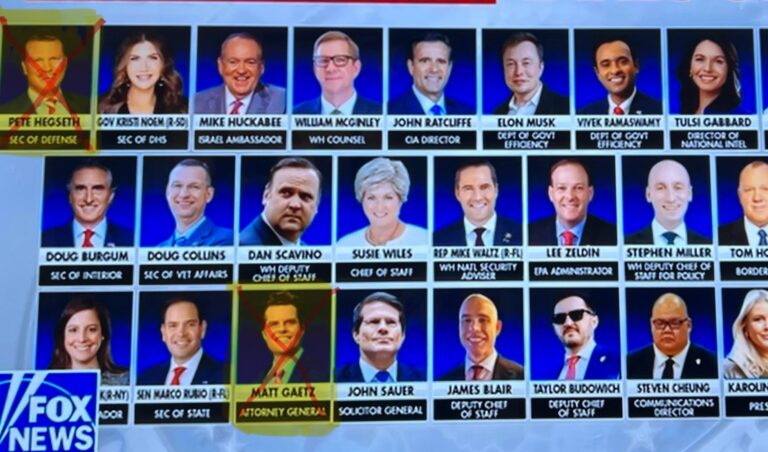America Spoke

In a scenario where Republicans gain control of the Executive, Legislative, and Judicial branches of the United States government, the conservative movement could see sweeping policy changes across core issues. Key areas impacted could include immigration reform, economic policy, women’s rights, and military stability on the global stage. Below, we explore the potential implications for each area with specific examples to illustrate how Republican influence across all three branches might reshape the nation’s future.
Immigration Reform
Conservatives generally advocate for stricter immigration controls and a focus on enforcing existing laws. With Republicans controlling all branches, immigration policy would likely lean toward enhanced border security, a recalibration of visa policies, and a reduction in pathways to citizenship.
- Stricter Border Security
With control over Congress, Republicans could pass legislation to fund additional border security measures, including extending physical barriers along the southern border. The executive branch could enforce this through DHS directives, while the judiciary would likely uphold the legality of stricter border controls. - Overhauling the Visa System
A Republican-controlled government could limit the number of H-1B and other work visas, emphasizing a merit-based system. This would potentially limit immigration from regions not considered aligned with U.S. interests, aiming to protect American workers from job competition. - End to “Sanctuary Cities”
Federal funding could be withdrawn from sanctuary cities under Republican leadership, as the executive and legislative branches work in tandem to penalize cities that protect undocumented immigrants. The judiciary, aligned with Republican interests, could back these penalties as constitutional.
Economic Policy
Republican economic policies often center on tax reduction, deregulation, and incentivizing business growth. A Republican-controlled government could streamline these initiatives, resulting in a pro-business climate that affects individuals and corporations alike.
- Corporate and Individual Tax Cuts
With all branches in sync, Republicans could enact tax cuts similar to the Tax Cuts and Jobs Act of 2017. Lowering corporate taxes could spur investment, job creation, and stock market growth, benefiting shareholders and high-income earners but potentially widening income inequality. - Deregulation of Key Industries
Republicans could push for deregulation in sectors like energy, finance, and healthcare. This would likely stimulate these industries by reducing costs associated with compliance, promoting growth at the potential expense of environmental and consumer protections. - Small Business Incentives
A Republican government might prioritize policies that incentivize small businesses through tax credits, reducing red tape, and expanding access to capital. This would be part of a broader economic growth strategy, aiming to make the U.S. more business-friendly.
Women’s Rights
Women’s rights under a Republican-controlled government could face significant shifts, especially concerning reproductive rights, healthcare access, and gender equality in the workplace. Republicans tend to prioritize conservative values, often aligning with traditional gender roles and limiting government intervention in family matters.
- Restrictive Abortion Legislation
The overturning of Roe v. Wade has already set a precedent, and with full control, Republicans could pass nationwide abortion restrictions. The judiciary, aligned with conservative judges, might uphold such restrictions, limiting women’s reproductive rights. - Limits on Gender-Affirming Healthcare
Republicans might legislate restrictions on gender-affirming care, especially for minors. The judicial branch could interpret these laws favorably, framing them as protective measures for children, impacting gender rights and LGBTQ+ access to healthcare. - Workplace Equality Programs
Federal funding for programs addressing gender inequality in the workplace might be reduced under a Republican-led government. Republicans often view such initiatives as unnecessary interventions, favoring a merit-based approach that could limit support for women’s advancement.
Military Stability on the World Stage
Republicans generally advocate for a strong national defense, often emphasizing military spending and American influence globally. Control over all branches would allow Republicans to define the U.S.’s military and diplomatic posture more assertively.
- Increased Defense Budget
Republicans might increase the military budget to strengthen defense capabilities and readiness, especially in light of rising global tensions. This funding could expand military technology and bolster U.S. presence in contested areas. - Stronger Alliances and Military Partnerships
Republican foreign policy often favors bolstering alliances with key partners, like NATO members, while limiting interactions with perceived adversaries. Increased funding could lead to joint military exercises and partnerships that solidify American influence. - Hardline Stance Against Global Adversaries
A Republican-controlled government might take a hardline stance against adversarial nations, such as China or Iran, using sanctions and military presence as tools of diplomacy. The executive branch could employ a more aggressive military stance, backed by congressional funding and judicial approval.
How it breaks down for us
A fully Republican-controlled government would likely drive policy changes that deeply reflect conservative values, affecting immigration, the economy, women’s rights, and military policy.
Under Republican governance, immigration policy would likely shift toward reducing undocumented immigration, securing the border, and instituting stricter visa controls. These changes would underscore a prioritization of national security and American jobs over open-border policies.
With Republicans leading the government, economic policies would likely prioritize tax cuts, deregulation, and business growth incentives, fostering a market-friendly climate that benefits businesses and investors but could face criticism for favoring corporations and high-income groups.
In a fully Republican government, policies affecting women’s rights might lean toward restricting abortion, limiting gender-affirming healthcare, and reducing funding for workplace equality. This could intensify debates over individual freedoms versus traditional values.
With all branches controlled by Republicans, military policy would likely see an increase in defense spending, stronger international alliances, and an assertive stance against global adversaries. These measures reflect a traditional conservative approach to ensuring American military dominance.
For supporters, this could mean a return to traditional American values and national security priorities. For critics, however, these policies might raise concerns over civil liberties and equitable social policy. The Republican movement’s vision of governance would reshape these issues in ways that could have lasting impacts on the nation’s future.






